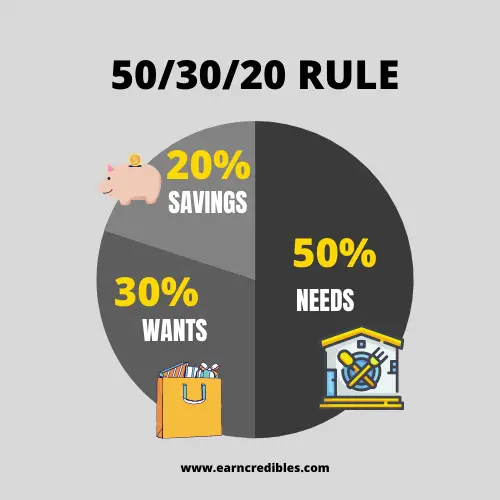Have you ever asked yourself the question, “how much of my paycheck should I save”? Well, you are not alone.
Saving money from your monthly paychecks can be challenging especially when you feel like you are just barely making ends meet. However, saving a certain amount from your salary every time you receive your paycheck can be an important strategy to have a financially stable future.
If you are wondering how much of your paycheck should you save, here are some guidelines to help you figure it out.
Table of Contents
What is Your Target Savings Goal?
Most people will say that they want to save money, but ask them how much money do you need to make and they are not sure. It is important to figure out your target savings goal to make it happen.
There are a LOT of ways to identify your target savings goals. You can start by listing the short-term goals you have. For example, if you still don’t have an emergency fund, then start with that. In addition, you can also have a long-term goal such as saving to buy a house and lot in the next 3 years.
Whatever your goals are, these should be clear to you. Take time to really think about those goals. Write them somewhere where you can easily see them, make them specific and measurable, and remember to place a deadline.
What Percentage of My Paycheck Should I Save?
Now that you have listed your savings goal, it’s time to calculate how much of your paycheck should you save.
You’ll find a lot of financial advice regarding this. A few experts suggest saving as little as 10% of your income, while some suggest 25% or more. But many sources recommend saving 20% each from your paycheck, which is what I also recommend.
So according to the popular 50/30/30 budgeting rule, 50% of your salary should be reserved for essentials like rent and food, 30% for discretionary spending, and the rest 20% for your savings.

Ultimately, the right percentage of your paycheck to be reserved for your savings will always depend on how much your take-home pay is, how much you are spending each month, and what your short- and long-term goals are.
For instance, if you are like me who is single but helps my family with their expenses, you would want to allot 60-65% for your essential spending, 10-15% for your expenses, and the 20% should always be distributed to your savings goals.
Now, there is no right answer to how much money you should save each month. The most important thing to remember here is that you should save as much as you can without compromising having some cash flow leftover to have a little fun with the present.
Where Should I Put My 20% Savings?
You should put your savings somewhere you won’t be tempted to spend it nor a place where it will only be sitting and lose value like a usual savings account.
Put Your Savings in High-Interest Savings Account
I highly recommend putting your money in a safe and special savings account that can earn you a few bucks each year in interest. Now, the point here is not to focus on the earnings from interest but to be able to compensate the value loss from the yearly inflation.
If you are in the Philippines, here are some of the digital banks that offer high-interest rates.
Ultimately, the idea here is to be able to secure your savings as well as stop you from the temptation to spend those savings.
I Can’t Save That Much From My Paycheck—Now What?
That’s fine. Don’t stress yourself out. Saving SOMETHING is better than NOTHING.
I fully understand if you are barely making it each month. I’ve been there and I know how frustrating and challenging it is to reserve a certain amount from your paycheck. But there are some things you can do to save money for your savings goals.
How to Save As Much Money From Your Paycheck by Spending Less
I always believe that to be able to save more, you have to spend less. Here are some practical tips on how to save money each month.
1. Spend less on interest rates
Paying off any credit card in full every month can help you avoid interest charges. However, I would recommend not to have a credit card if you have no idea about the charges or credit cards in general. Purchasing with cash can always be the way to go.
One thing I would really recommend regarding interest rates is to NOT borrow money from anyone or a lending company. Whether or not the interest rate is low, if you don’t NEED to borrow, then DON’T!
2. Spend less on groceries
Food is a necessity for everyone. No matter what you eat, you will need to spend. However, there are pretty simple ways you can do to save from your grocery spending.
- Plan out meals for the week in advance so you don’t buy more than you need
- Shop at grocery stores with lower prices per unit of food when possible, like Costco or Aldi’s.
- Use apps like Ibotta to get cashback for when you do buy something.
- Find deals and coupons to save more.
- Cook and eat at home rather than at restaurants.
3. Save more by spending less in other areas of life
Cutting back on luxury items that are not necessities, like cable, premium coffee brands, and subscriptions services can save you more money than you think. For instance, canceling your $17.99 premium Netflix monthly subscription can save you $215 in a year, which can be used to buy more important things.
Final Thoughts
It can be very overwhelming to figure out how much money you should be saving from your paycheck to have a well-rounded financial future.
What’s more challenging is to ACTUALLY save a certain amount considering your income, your monthly expenses, and your future goals.
The good news, however, is that you don’t need to achieve your savings goals overnight. Start saving one paycheck at a time.
You can’t save 20% of your income? That’s fine. Start small. If you can save 1%, that good. 5%? That’s even better. After all, it’s a process that you should enjoy.
I hope you learned something from this article. How much do you save from your paycheck each month? Feel free to share them in the comment section below.




